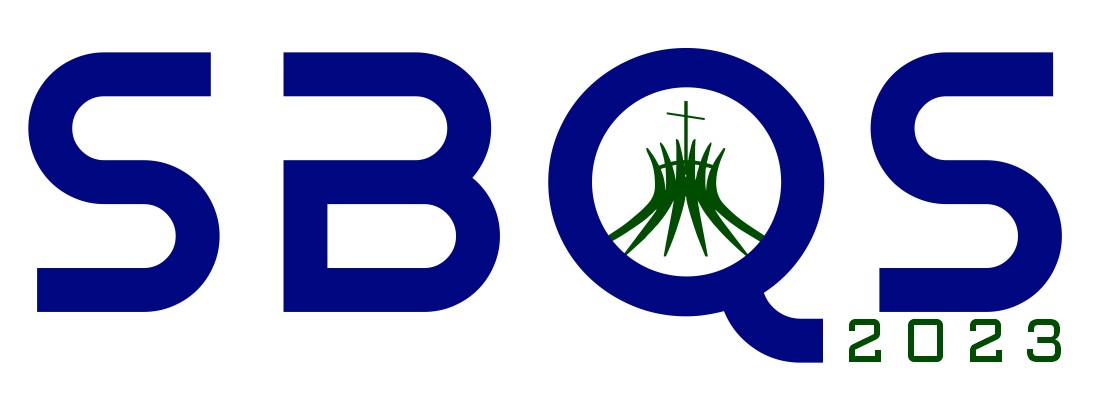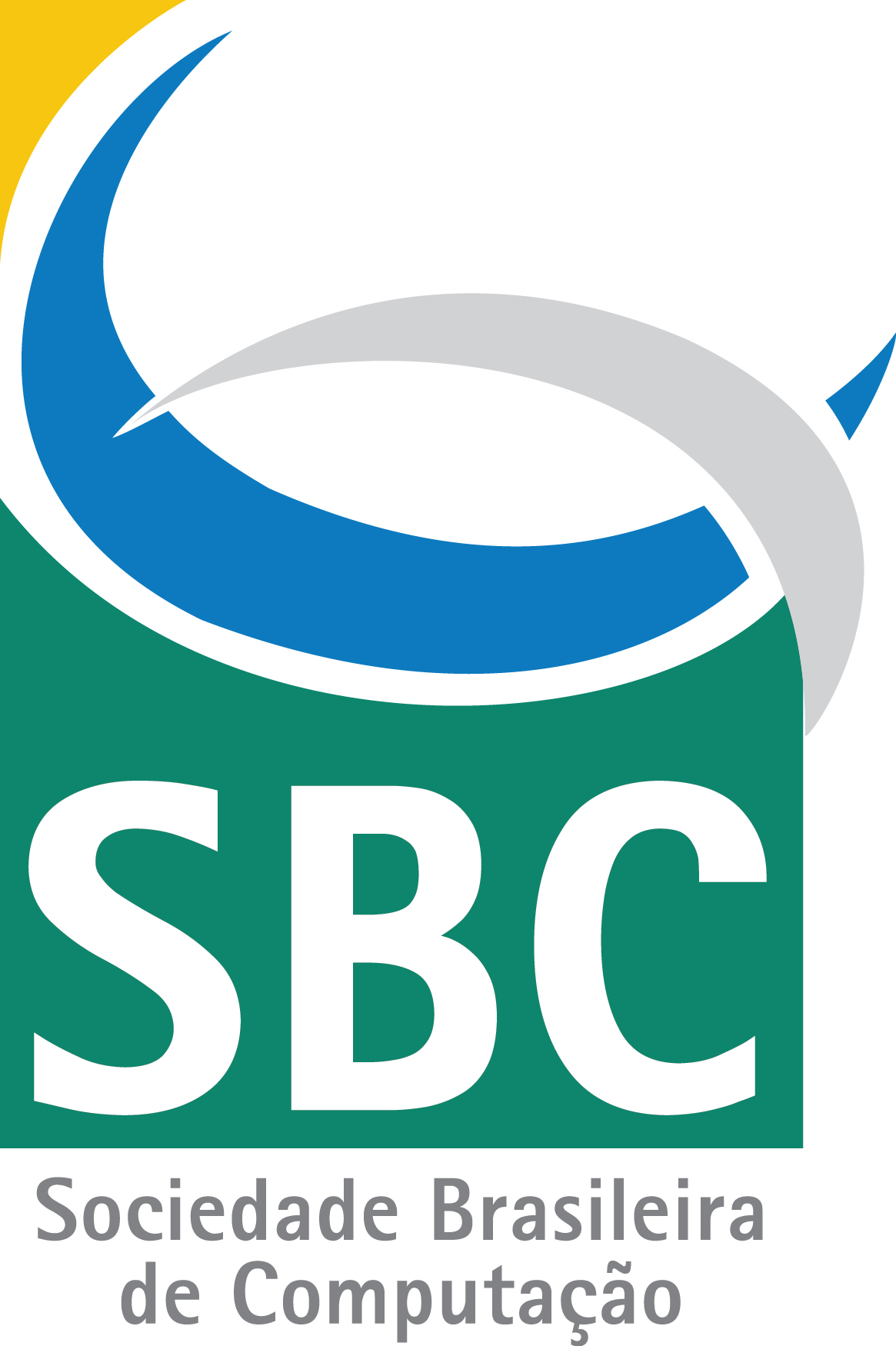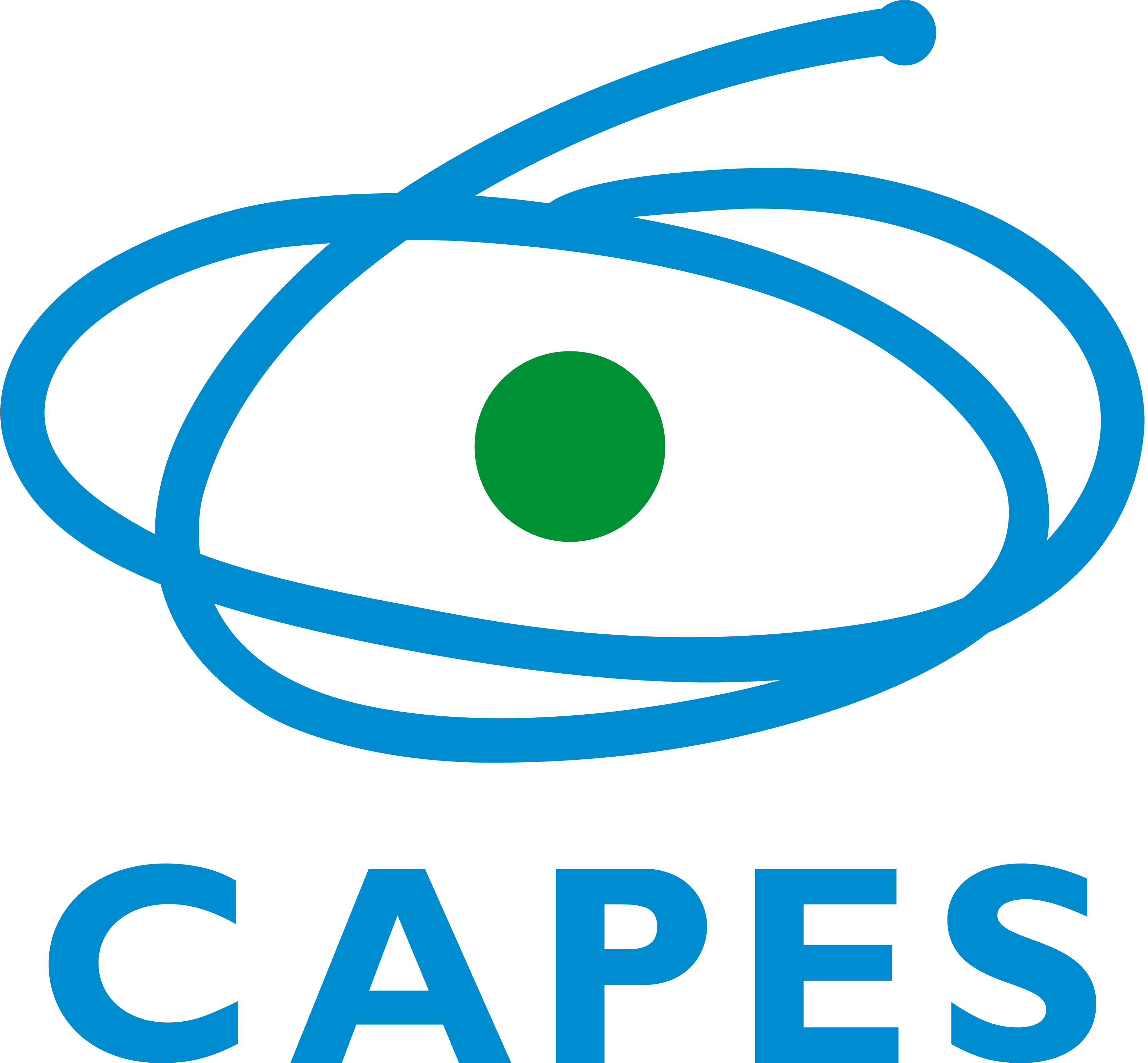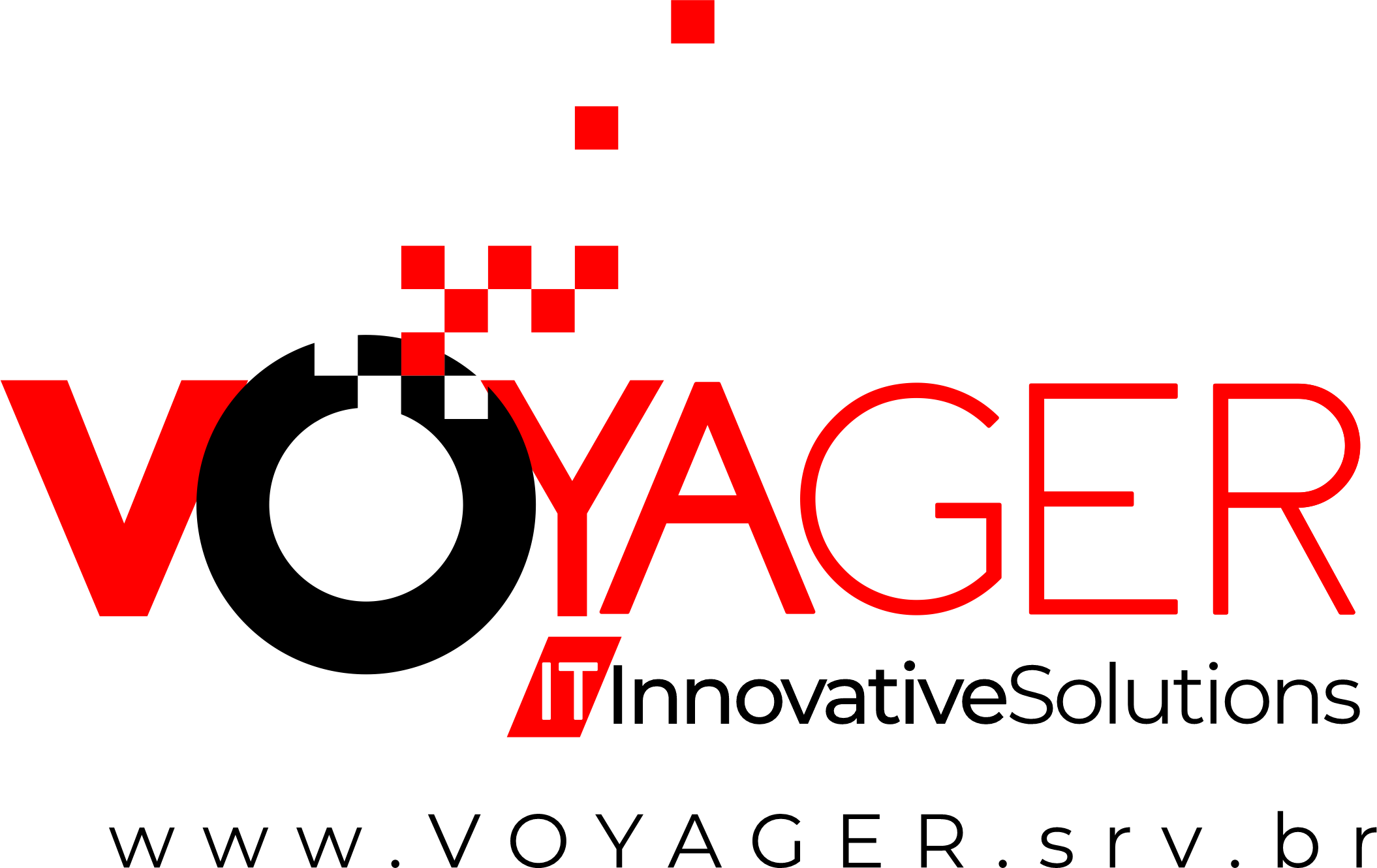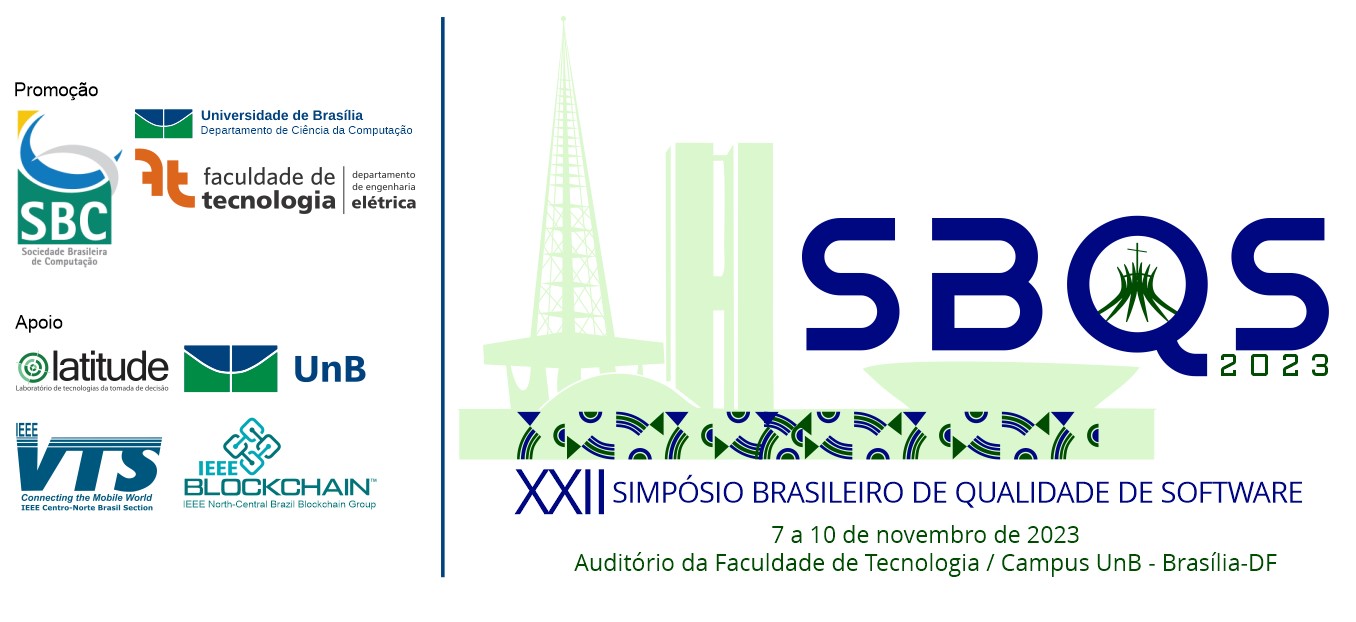CALL FOR PAPERS – SOFTWARE QUALITY EDUCATION TRACK
SBQS 2023: The 22st Brazilian Symposium on Software Quality
November 7th to 10th, 2023, Brasília, DF, Brazil
SBQS
The Brazilian Symposium on Software Quality is the main Brazilian forum devoted to Software Quality. Software quality manifests in two complementary and dependent aspects: Process Quality and Product Quality. Due to the current dependence on software and value-added services, research on software quality and its application to products and services is both a necessity and a differential to provide value to organizations and their business.
Since its conception, SBQS has focused on the exchange of experiences between academia and industry, providing an environment where researchers, educators and the community of practice of Software Quality and Software Engineering meet to present and discuss ideas, experiences and findings, aiming at innovation with the potential to positively influence the software industry.
Aim and Scope
The SBQS Software Quality Education Track is looking for contributions that address challenges, innovations, and best practices in Software Quality education. We are interested in discussing how to promote significant learning concerning Software Quality to future software quality professionals and researchers.
Topics of Interest
Submissions on all topics related to Software Quality education are welcome. We are particularly interested in papers addressing curriculum development, empirical studies, best practices, personal or institutional experiences, and conceptual or theoretical work. We are open to a wide range of topics, including (but not limited to):
- New and innovative best practices for software quality education
- Methodological aspects of software quality education
- Innovative curriculum or course formats
- Teaching of software quality in Software Engineering courses, Computer Science courses, Information Systems courses, Information Technology courses and others
- Teaching of processes, methods, techniques, and tools for software quality
- Use of active learning methodologies for software quality education
- Problem-based teaching/learning in software quality
- Tools and methods for evaluating software quality learning
- Use of tools, simulators, and games in software quality education
- Use of games and competitions (“gamification”) in software quality education
- Integration of practical experiences into software quality education
- Educational research methods in software quality education
- Research and practice synergies for software quality education
- Interdisciplinarity in software quality education (with other disciplines and courses)
- Innovative methods to keep professors updated for teaching software quality
- Methods for e-teaching/e-learning in software quality
- Education in software quality that stimulates entrepreneurship
- Cooperation in software quality education between industry and academia
Evaluation Criteria
Papers on this track will be reviewed based on their originality, relevance, technical soundness, and clarity of presentation.
Important Dates
- Paper registration (abstract submission): July 18th, 2023 August 01st, 2023 (hard)
- Paper submission: July 25th, 2023 August 01st, 2023 (hard)
- Rebuttal period: September 04th to September 13th, 2023
- Notification of acceptance: September 19th, 2023 September 26th, 2023
- Camera-ready version: September 26th, 2023 October 05th, 2023
Manuscript Preparation and Submission
All submissions must be in PDF format and must follow the two-column ACM format for conferences (Interim template), available in ACM SIG Proceedings Templates. The use of LaTex (sigconf) is strongly recommended. In this case, authors should use the acmart.cls class provided in the template with the conference format enabled in the preamble of the document: \documentclass[sigconf]{acmart} and also apply the ACM-Reference-Format.bst bibliography style provided in the template: \bibliographystyle{ACM-Reference-Format}.
If authors choose to use Word format, they should be aware that if their paper is accepted, it will be the authors' responsibility to take all actions to ensure that the file is correct and validated by the ACM system (which may require handling macro errors or changing the format of the paper to LaTex).
They must be no longer than 10 pages, including all figures, tables, appendixes, references and acknowledgment. Papers must be submitted electronically through the JEMS system.
Papers should be written in Portuguese or English. Submissions in English are strongly encouraged. The proceedings will be published in the ACM Digital Library and also indexed by the SBC Open Library.
Submissions that are not in compliance with the required format or that are out of the scope of the Software Quality Education Track will be rejected without review.
The review process includes a rebuttal period in which the authors will have access to the reviewers’ comments and may argue and answer questions from the reviewers before the final acceptance/rejection decision.
The acceptance of an paper implies that at least one of the authors must register to SBQS, including the respective publication fee(s), to present it in person during the event and that authors must provide extra files required by the general chair (for example, the previous presentation video following the requested format by SBQS). Additionally, for the purpose of speeding up the publication process, authors of accepted papers must fill some forms requested by the proceedings chair on specific dates.
Papers submitted to the SBQS Education Track must not have been simultaneously submitted to any other forum (conference or journal), nor should they have already been published elsewhere.
Double-Blind
The SBQS 2023 Education Track adopts a double-blind review process. Thus, submitted papers must omit any information that would allow their authors to be identified. To this end:
- Authorship information should be omitted (i.e., the paper should not include authors' names and affiliations, as well as other information that would allow authors to be identified, such as university name, project identification, or funding information);
- References to previous work by the authors should be presented in the third person (e.g., use "in the work of Sousa et al." instead of "in our work") or by anonymizing the reference in the references section (e.g., instead of "this work evolves the proposal of Sousa et al.", one can use "this work evolves our previous proposal presented in [ref]", and the reference [ref] can be included as "[ref] Reference omitted due to double-blind review" in the references section);
- If the paper includes links to artifacts related to the work, only repositories or websites that do not allow identification of the authors should be cited. To anonymize GitHub-based repositories you can use the anonymous service (https://anonymous.4open.science/).
Note that reviewers will not be encouraged to search other sources for references that identify the authors. Searching digital libraries or existing artifacts does not compromise the double-blind review process.
If the article is accepted, information omitted in the submitted version should be included in the final version.
Use of AI-assisted technologies in papers submitted to SBQS 2023
Papers submitted to the SBQS 2023 tracks should strictly follow the guidelines below regarding the use of AI or AI-assisted technologies (they were inspired by Elsevier and International Conference on Machine Learning policies).
What is forbidden:
- Text or image produced/generated entirely by AI or AI-assisted technologies; and
- Any AI or AI-assisted technology as an author.
What is allowed:
- Using AI or AI-assisted technologies for editing or polishing author-written text;
- Using AI or AI-assisted technologies for improving the quality of images regarding contrast and clarity; and
- Investigating the use of AI or AI-assisted technologies to support Software Engineering activities relevant to Software Quality.
Best Paper Award
SBQS rewards the best paper of each track every year. The Software Quality Education Track chairs and SBQS Steering Committee will choose the winning paper in this track from the Program Committee reviews. The award-winning papers are announced at the event.
Authors of the best papers are invited to submit extended versions for publication in a special issue of the Journal of Software Engineering Research and Development (JSERD).
Program Co-Chairs
Uirá Kulesza (UFRN)
Érica Ferreira de Souza (UTFPR)
SBQS Steering Committee
Adriano Bessa Albuquerque (UNIFOR)
Davi Viana (UFMA)
Edna Dias Canedo (UnB)
Gleison Santos (UNIRIO)
Ivan Machado (UFBA)
Monalessa Perini Barcellos (UFES)
Rodrigo Santos (UNIRIO)
Sheila Reinehr (PUCPR)
Tayana Conte (UFAM)
Proceedings Chair
Simone Dornelas Costa (UFES)
Education Track Technical Program Committee
Ana Regina Rocha (COPPE/UFRJ)
Anna Beatriz Marques (UFC)
Auri Marcelo Rizzo Vincenzi (UFSCar)
Awdren Fontão (UFMS)
Bruno Gadelha (UFAM)
Christiane Gresse von Wangenheim (UFSC)
Crescencio Lima (IFBA)
Danilo Ribeiro (Zup Innovation)
Davi Viana (UFMA)
Edson OliveiraJr (UEM)
Eduardo Figueiredo (UFMG)
Elisa Nakagawa (USP)
Emanuel Coutinho (UFC)
Fabiano Ruy (IFES)
Fernando Kamei (IFAL)
Giani Petri (UFSM)
Heitor Costa (UFLA)
Hudson Borges (UFMS)
Ivan Machado (UFBA)
Jean Hauck (UFSC)
Monica Anastassiu (UNIRIO)
Rodrigo Reis (UFPA)
Rodrigo Santos (UNIRIO)
Sandro Ronaldo Bezerra Oliveira (UFPA)
Simone Souza (ICMC-USP)
Simone Vasconcelos (IFF)
Tayana Conte (UFAM)
Valéria Lelli (UFC)
Valdemar Vicente Graciano Neto (UFC)
Walter Nakamura (UTFPR)

